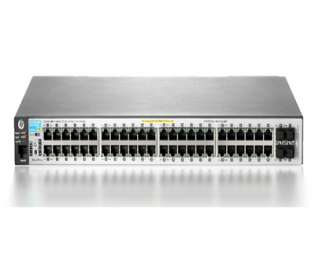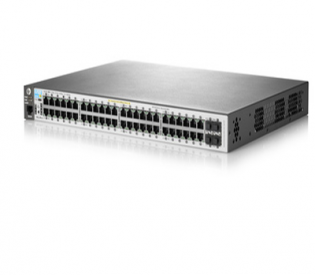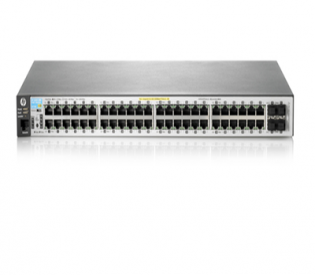HP 2530-48G-PoE+ Switch J9772A
Fixed Port Layer-2 Managed Ethernet Switch.
– 48 RJ-45 autosensing 10/100/1000 PoE+ ports, 4 fixed Gigabit Ethernet SFP ports (Min 0 // Max 4 SFP)
Features
Quality of Service (QoS)
– Traffic prioritization (IEEE 802.1p): allows real-time traffic classification with support for eight priority levels mapped to either two or four queues; uses weighted deficit round robin (WDRR) or strict priority (SP)
– Simplified QoS configuration: Port-based: prioritizes traffic by specifying a port and priority level. VLAN-based: prioritizes traffic by specifying a VLAN and priority level.
– Class of Service (CoS): sets the IEEE 802.1p priority tag based on IP address, IP Type of Service (ToS), Layer 3 protocol, TCP/UDP port number, source port, and DiffServ
– Rate limiting: sets per-port ingress enforced maximums for all ingressed traffic or for broadcast, multicast, or unknown destination traffic
– Layer 4 prioritization: enables prioritization based on TCP/UDP port numbers
Management
– Choice of management interfaces: Web graphical user interface (GUI): HTML-based easy-to-use graphical interface allows configuration of the switch from any Web browser. Command-line interface (CLI): provides advanced configuration and diagnostics through a robust CLI. Simple Network Management Protocol (SNMPv1/v2c/v3): allows a switch to be managed with a variety of third-party network management applications.
– Virtual stacking: provides single IP address management for up to 16 switches
– sFlow (RFC 3176): delivers wire-speed traffic accounting and monitoring configured by SNMP and CLI with three terminal encrypted receivers
– IEEE 802.1AB Link Layer Discovery Protocol (LLDP): automates device discovery protocol for easy mapping by network management applications
– Logging: provides local and remote logging of events via SNMP (v2c and v3) and syslog; provides log throttling and log filtering to reduce the number of log events generated
Connectivity
– IPv6: IPv6 host: allows the switch to be deployed and managed at the edge of an IPv6 network. Dual stack (IPv4/IPv6): supports connectivity for both protocols; provides a transition mechanism from IPv4 to IPv6. MLD snooping: forwards IPv6 multicast traffic to the appropriate interface; prevents IPv6 multicast traffic from flooding the network.
– IEEE 802.3af Power over Ethernet (PoE): provides up to 15.4 W per port to IEEE 802.3af-compliant PoE-powered devices such as IP phones, wireless access points, and security cameras
– IEEE 802.3at Power over Ethernet Plus: provides up to 30 W per port to IEEE 802.3 for PoE/PoE+-powered devices such as video IP phones, IEEE 802.11n wireless access points, and advanced pan/tilt/zoom security cameras (see product specifications for total PoE power available)
– Auto-MDIX: adjusts automatically for straight-through or crossover cables on all ports
– Pre-standard PoE support: detects and provides power to pre-standard PoE devices
Layer 2 switching
– VLANs: provides support for 512 VLANs and 4,094 VLAN IDs
– Jumbo packet support: supports up to 9220-byte frame size to improve the performance of large data transfers; 8- and 24-port Fast Ethernet models automatically support up to 2000-byte frames with no configuration needed
– 16K MAC address table: provides access to many Layer 2 devices
– GARP VLAN Registration Protocol: allows automatic learning and dynamic assignment of VLANs
– Per-VLAN Spanning Tree Plus (PVST+): allows each VLAN to build a separate spanning tree to improve link bandwidth usage in network environments with multiple VLANs



